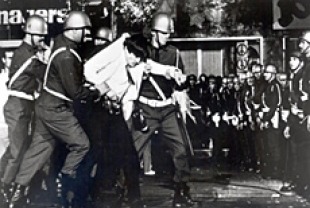Z, winner of the Academy Award as the Best Foreign Language Film of 1969, is one of the most riveting political films ever made. We are told at the outset that "any resemblance to real people and events is purely intentional." The real event was the death in 1963 of Grigorios Lambrakis, a professor of medicine at the University of Athens and an ardent spokesperson for liberal causes. After giving a speech at an Assembly of The Friends of Peace, he was run down by a three-wheel delivery truck and died three days later without ever regaining consciousness. The police made it look like a regrettable accident; his followers called it an assassination.
The film recreates the incidents surrounding the speech, the crime, and the investigation. Yves Montand as the Doctor portrays the character of a man motivated by common sense and a desire for peace in dangerous times. Jean-Louis Trintignant is the investigating judge who relentlessly seeks the truth surrounding the politically charged death.
Director Costa-Gavras focuses on conditions in Greece at the time that are still rampant in many countries around the world: the corrupt and corrosive lust for power that lies behind the orderly facades of government, the stormy battles between idealistic young people and the menacing movements of fascists. Vassilis Vassilikos, in speaking about the book on which the film is based, observed: "In writing Z I wanted to show, more than the precise case of Z, the mechanism of political crime in our time."
Thanks to the striking performances of Yves Montand and Jean-Louis Trintignant, the gripping cinematic style of Costa-Gavras, and the brilliant camera work of Raoul Coutard; Z is a universally appealing work of art which flushes repressive monsters from phony lairs and reveals the complex forces at work within the world to manipulate the minds of the ignorant and destroy the gallant.
For Americans, this stirring 1969 film packs another punch because the supporting power behind the Greek government was the United States. Z presents powerful images of the infection of violence, calamity, and murder. It will trouble the consciences of all those who long for justice in times of beastliness.
The 2002 DVD release includes a commentary track with Costa-Gavras, interviews, a photo gallery, the original theatrical trailer, and fimographies.
